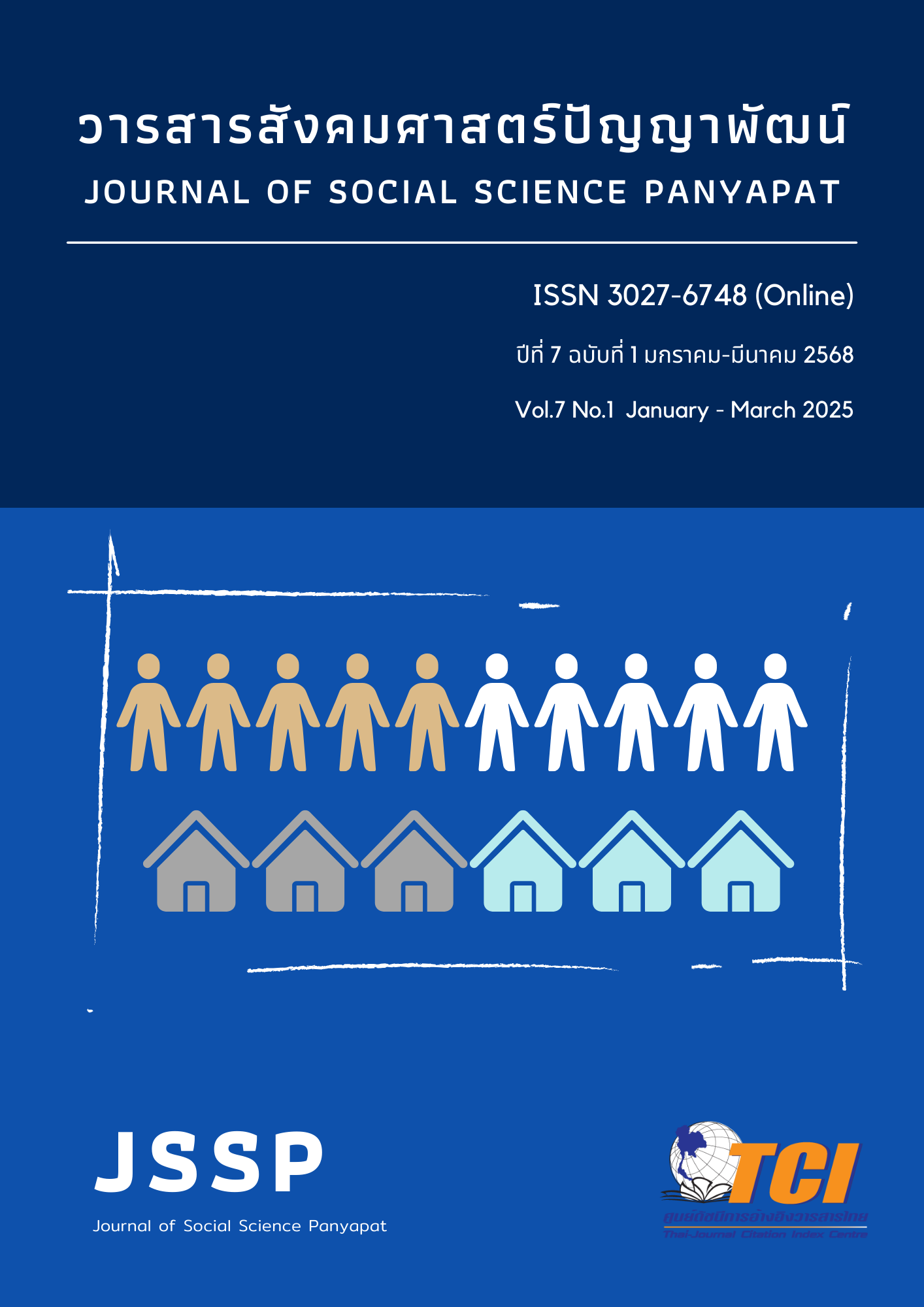ภาวะผู้นำทางการเรียนการสอนที่ส่งผลต่อการบริหารงานวิชาการของสถานศึกษา สังกัดสำนักงานเขตพื้นที่การศึกษาประถมศึกษานครศรีธรรมราช เขต 1
คำสำคัญ:
ภาวะผู้นำทางการเรียนการสอน, การบริหารงานวิชาการ, สถานศึกษาบทคัดย่อ
บทความวิจัยนี้มีวัตถุประสงค์เพื่อศึกษา (1) ภาวะผู้นำทางการเรียนการสอนของผู้บริหารสถานศึกษา (2) การบริหารงานวิชาการของสถานศึกษา (3) ภาวะผู้นำทางการเรียนการสอนที่ส่งผลต่อการบริหารงานวิชาการของสถานศึกษา และ (4) แนวทางการพัฒนาภาวะผู้นำทางการเรียนการสอนที่ส่งผลต่อการบริหารงานวิชาการของสถานศึกษา สังกัดสำนักงานเขตพื้นที่การศึกษาประถมศึกษานครศรีธรรมราช เขต 1 การวิจัยครั้งนี้เป็นการวิจัยเชิงผสมผสาน กลุ่มตัวอย่างที่ใช้ ได้แก่ ข้าราชการครู จำนวน 248 คน เครื่องมือที่ใช้เก็บรวบรวมข้อมูล ได้แก่ แบบสอบถามและแบบสัมภาษณ์แบบมีโครงสร้าง (Structured Interview) สถิติที่ใช้ในการวิเคราะห์ข้อมูล ได้แก่ ความถี่ ร้อยละ ค่าเฉลี่ย ส่วนเบี่ยงเบนมาตรฐาน ค่าสัมประสิทธิ์สหสัมพันธ์แบบเพียร์สัน การวิเคราะห์การถดถอยเชิงพหูคูณ ผลการวิจัยพบว่า 1) ภาวะผู้นำทางการเรียนการสอนของผู้บริหารสถานศึกษา โดยภาพรวมอยู่ในระดับมากที่สุด 2) การบริหารงานวิชาการของสถานศึกษา โดยภาพรวมอยู่ในระดับมากที่สุด 3) ภาวะผู้นำทางการเรียนการสอนของผู้บริหารสถานศึกษาทั้ง 4 ด้าน ร่วมกันสามารถพยากรณ์ผลต่อการบริหารงานวิชาการของสถานศึกษาได้ถึงร้อยละ 77.00 โดยมีความสัมพันธ์อย่างมีนัยสำคัญทางสถิติที่ระดับ .01 4) แนวทางการพัฒนาภาวะผู้นำทางการเรียนการสอนที่ส่งผลต่อการบริหารงานวิชาการของสถานศึกษา ปรากฏผล 5 ด้าน ได้แก่ การกำหนดทิศทางการพัฒนา การปรับปรุงหลักสูตร การประเมินและกำกับติดตามการเรียนการสอน การส่งเสริมความสัมพันธ์เชิงบวกและความร่วมมือระหว่างคณะครู และการพัฒนาความก้าวหน้าในวิชาชีพของครู ทำให้บรรลุตามวัตถุประสงค์
เอกสารอ้างอิง
ปัทมพร พงษ์เพชร. (2561). ทักษะผู้บริหารสถานศึกษาในศตวรรษที่ 21 ที่ส่งผลต่อการบริหารงานวิชาการ ของโรงเรียน สังกัดสำนักงานเขตพื้นที่การศึกษาประถมศึกษาฉะเชิงเทรา เขต 2. (ศึกษาศาสตรมหาบัณฑิต, มหาวิทยาลัยราชภัฏราชนครินทร์).
พิชิต ฤทธิ์จรูญ และ ชาญชัย เจริญทรัพย์. (2559). การศึกษาภาวะผู้นำทางการเรียนการสอนของผู้บริหารสถานศึกษา: การวิเคราะห์จากข้อมูลเชิงปริมาณ. วารสารการศึกษาภาควิชา, 22(1), 45-60.
พิมพ์ชนก ธาดาสิริพัฒน์. (2562). ความสัมพันธ์ระหว่างภาวะผู้นำทางการเรียนการสอนของผู้บริหารสถานศึกษาในสังกัดองค์การปกครองส่วนท้องถิ่น. (ศึกษาศาสตรมหาบัณฑิต, มหาวิทยาลัยสุโขทัยธรรมาธิราช).
มุทิตา ชมชื่น. (2561). ความสัมพันธ์ระหว่างการบริหารงานวิชาการของผู้บริหารกับประสิทธิผลของสถานศึกษาในสังกัดสำนักงานเขตพื้นที่การศึกษาประถมศึกษาราชบุรี เขต 1. (ครุศาสตรมหาบัณฑิต, มหาวิทยาลัยราชภัฏหมู่บ้านจอมบึง).
สำนักคณะกรรมการการศึกษาขั้นพื้นฐาน. (2561). รายงานสถานการณ์การศึกษาของประเทศไทย. กรุงเทพฯ: สำนักงานคณะกรรมการการศึกษาขั้นพื้นฐาน.
สำนักงานเขตพื้นที่การศึกษาประถมศึกษานครศรีธรรมราช เขต 1. (2567). ข้อมูลพื้นฐานสำนักงานเขตพื้นที่การศึกษาประถมศึกษานครศรีธรรมราช เขต 1. สืบค้นจาก http://www.nst1.go.th/home/index.php/2020-06-17-11-58-17.
สิริวัฒน์ บริพิศ. (2562). ภาวะผู้นำทางการเรียนการสอนของผู้บริหารสถานศึกษาในศตวรรษที่ 21 ของสถานศึกษา สังกัดสำนักงานเขตพื้นที่การศึกษามัธยมศึกษา เขต 11 จังหวัดสุราษฎร์ธานี. (ศึกษาศาสตรมหาบัณฑิต, มหาวิทยาลัยราชภัฏสุราษฎร์ธานี).
สุทธิศักดิ์ โคกคาน (2566). ภาวะผู้นำทางวิชาการของผู้บริหารสถานศึกษาที่ส่งผลต่อการดำเนินงานประกันคุณภาพภายในสถานศึกษา สังกัดสำนักงานเขตพื้นที่การศึกษาประถมศึกษาตราด. (ศึกษาศาสตรมหาบัณฑิต, มหาวิทยาลัยราชภัฏรำไพพรรณี).
สุรชัย จารุภูมิ และ ธนพร วิเศษสุข. (2560). การบริหารงานวิชาการของสถานศึกษา: การใช้การวิเคราะห์ค่าเฉลี่ยและส่วนเบี่ยงเบนมาตรฐานในการประเมินผล. วารสารการศึกษาทางการบริหาร, 30(3), 75-90.
Hallinger, P. (2009). Leadership for learning: Does leadership make a difference?. Educational Administration Quarterly, 45(5), 736-771.
Jazzar, M., & Algozzine, B. (2007). Leadership for school improvement. London: Pearson Education.
Krejcie, R. V. & Morgan, D. W. (1970). Determining Sample Size for Research Activities. Educational and Psychological Measurement, 30(3), 607–610.
Likert, R. (1932). A Technique for the Measurement of Attitudes. Archives of Psychology, 140, 1–55.
MacBeath, J. (2013). Leadership for learning: A review of the research. Educational Management Administration & Leadership, 41(1), 5-23.
Weber, E. (1996). Educational reform: Key components for school improvement. Educational Administration Quarterly, 32(3), 262-278.
ดาวน์โหลด
เผยแพร่แล้ว
รูปแบบการอ้างอิง
ฉบับ
ประเภทบทความ
สัญญาอนุญาต
ลิขสิทธิ์ (c) 2025 วารสารสังคมศาสตร์ปัญญาพัฒน์

อนุญาตภายใต้เงื่อนไข Creative Commons Attribution-NonCommercial-NoDerivatives 4.0 International License.


